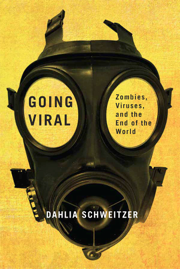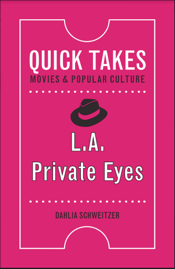
About Dahlia
DAHLIA SCHWEITZER is a pop culture critic, writer, and professor. Described by Vogue as “sexy, rebellious, and cool,” Schweitzer writes about film, television, music, gender, identity, and everything in between. She studied at Wesleyan University, lived and worked in New York City and Berlin, and completed her MA and PhD at the Art Center College of Design and UCLA. She is currently chair of the Film and Media department at the Fashion Institute of Technology in New York City.
In addition to her books, Dahlia has essays in publications including Cinema Journal, Journal of Popular Film and Television, Hyperallergic, Jump Cut, Quarterly Review of Film and Video, and The Journal of Popular Culture. She has also released several albums of electronic music, including Plastique and Original Pickup.

Professor
As a professor of film and media studies, Dahlia exposes her students to a variety of theoretical approaches and cinematic techniques, asking them to approach both with analytical inquisitiveness. Her aim is to pass her own curiosity on to her students, encouraging them to think across their classes and experiences to create intellectual connections between course materials and the world in which they live. She strives to remind her students that the loudest voice is not necessarily correct, and in so doing, helps them find their own.

Media Critic
Declared “one of the world’s leading analysts of popular culture” by renowned author Toby Miller, Dahlia writes about film, television, music, gender, identity, and everything in between. Her work can be found across mainstream, academic, and emergent channels in both long and short form. Repeatedly drawn to popular culture, Dahlia loves to analyze and unpack cultural artifacts in order to explore how they reflect social and historical issues, as well as looking at how they reinforce or interrogate common cultural assumptions.

Author
Dahlia has written numerous books exploring aspects of film and television. Regardless of the topic—serial killers, private detectives, or even zombies—all of her writing engages directly with questions of self versus other, private versus public space, examining depictions of gender, identity, and race. She traces how these depictions evolve and examines what they mean about our changing world. In her latest project, Dahlia explores the ways haunted homes have become a venue for dramatizing anxieties about family, gender, race, and economic collapse.
Blog
I Was an LAPD Reject (part four)
The physical test ended up being rescheduled due to a bad storm, some flooding, and a power outage. Which was probably for the best, because it would have been a total waste of time, anyway, since the LAPD rejected me.The way it works is that you get a letter in the mail. I didn’t expect it before the interview, I figured they would, at least, want to meet me, but no. They decided they didn’t want me without ever meeting me.This was the letter I received:They had concerns with my maturity and...
I Was an LAPD Reject (part three)
I would say that this next step in the process terrified me the most, but it didn’t. After my background investigation meeting, and chatting with the friendly man in the cardigan, I was feeling pretty optimistic about things. I was more curious about the lie detector test than anything else.If I’d known how medieval it was going to be, I would have been more nervous.Because what you don’t know when you watch these things on tv is just how physically uncomfortable they are.First you sit down in...
12 Years a Slave, Torture Porn, and the Unfortunate Problem of American Apathy
There’s a term in cinema called the “snuff film.” A snuff film, for those lucky enough not to know, is a film that depicts the actual murder of a person or people for entertainment purposes, erotic or otherwise. The claim to fame of a snuff film is that there are no special effects, that the violence is real, and therefore special, exquisite, what-have-you. The joy comes from watching the violence and the pain. A recent article by Andrew Romano in the The Daily Beast attempts to explain the...




